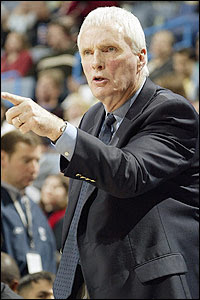 Hubie Brown Thoughts-
Hubie Brown Thoughts-You try to tell guys, will you please wait 'til the screener is set?-
You cannot feed a guy in the post from above the free throw line.
-When you're defending the postman, never turn your back back when someone's cutting.
- You try to tell guys, you never dribble just once.
- You must remember, young players, who are you fouling?
- You cannot allow a big man to take the ball uncontested from half court. You must cut him off at the circle.
- Your man leaves you, you cut to the front of the rim
- You must pound the boards, force the ball up, and the fatigue factor will free up easy threes.- You always give it to the guy who's cutting and has the high percentage shot.
- You must take advantage of turnovers and second shots.
- When running the UCLA offense, you must jam the passer.
- Any time the ball goes to the wing and a back screen is set by the center or forward or the point guard, someone must help him out -- or else jam the passer.
- If you front the low post or gamble for a steal, it's a layup.
- Any time you get in that area [the lane], you try to make a bounce pass.
- You're either going to trap or you're going to force the dribbler high -- but you cannot allow him to turn the corner.
- If you're going to force him, force him baseline -- do not allow him to get into the lane.
- Post-up guys, will you please catch the ball with both hands, then get good position, then turn to the basket.
- You always want to create angles when you start the fast break.
- If you're going to front and you catch a lob you cannot send up anything soft.- On dribble penetration you can let your man go baseline, but if they go to the lane instead... Come on! Where's the help?
- You cannot send all 3 guys to the basket because the post up man will have no one to pass to.- Whenever the defensive team fronts the low post, you must clear out the opposite side low box defender.
- You try to tell guys, when you're playing against good half-court defense not to pass the ball off the dribble because you cannot take it back if the defense reacts.
- You cannot front a great post-up player unless you also jam the passer.- In the transition offense you cannot post a man that close to the basket
.- You cannot leave your feet unless you are shooting the ball.- You always tell defenders, make the ball change direction.






















